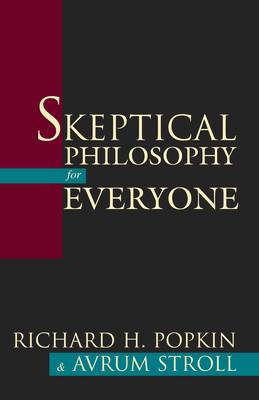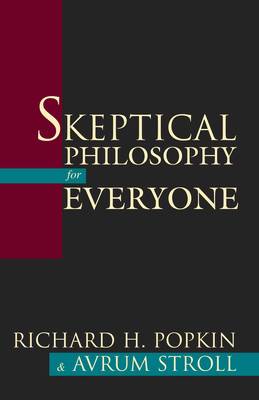
- Afhalen na 1 uur in een winkel met voorraad
- Gratis thuislevering in België vanaf € 30
- Ruim aanbod met 7 miljoen producten
- Afhalen na 1 uur in een winkel met voorraad
- Gratis thuislevering in België vanaf € 30
- Ruim aanbod met 7 miljoen producten
Zoeken
€ 57,95
+ 115 punten
Omschrijving
This lucid, informal, and very accessible history of Western thought takes the unique approach of interpreting skepticism--i.e., doubts about knowledge claims and the criteria for making such claims--as an important stimulus for the development of philosophy. The authors argue that practically every great thinker from the time of the Greeks to the present has produced theories designed to forestall or refute skepticism: from Plato to Moore and Wittgenstein. The influence of and responses to such 20th-century skeptics as Russell and Derrida are also discussed critically.
Popkin and Stroll review each major theory of philosophy chronologically and then further organize these theories into their respective subject areas: metaphysics, epistemology, ethics, political philosophy, and philosophy of religion. Within each subject area the authors discuss how the skeptical challenge gave rise to new philosophical positions. The volume concludes with an especially interesting debate between the authors on the merits of skepticism today. Stroll thinks that ultimately the doubts expressed by skeptics can be refuted, while Popkin denies this.
This is an outstanding introduction to the problems of philosophy by two eminent philosophers with a gift for presenting the history of ideas in a very enjoyable fashion.
Popkin and Stroll review each major theory of philosophy chronologically and then further organize these theories into their respective subject areas: metaphysics, epistemology, ethics, political philosophy, and philosophy of religion. Within each subject area the authors discuss how the skeptical challenge gave rise to new philosophical positions. The volume concludes with an especially interesting debate between the authors on the merits of skepticism today. Stroll thinks that ultimately the doubts expressed by skeptics can be refuted, while Popkin denies this.
This is an outstanding introduction to the problems of philosophy by two eminent philosophers with a gift for presenting the history of ideas in a very enjoyable fashion.
Specificaties
Betrokkenen
- Auteur(s):
- Uitgeverij:
Inhoud
- Aantal bladzijden:
- 325
- Taal:
- Engels
Eigenschappen
- Productcode (EAN):
- 9781573929363
- Verschijningsdatum:
- 1/11/2001
- Uitvoering:
- Hardcover
- Formaat:
- Genaaid
- Afmetingen:
- 155 mm x 240 mm
- Gewicht:
- 693 g

Alleen bij Standaard Boekhandel
+ 115 punten op je klantenkaart van Standaard Boekhandel
Beoordelingen
We publiceren alleen reviews die voldoen aan de voorwaarden voor reviews. Bekijk onze voorwaarden voor reviews.








